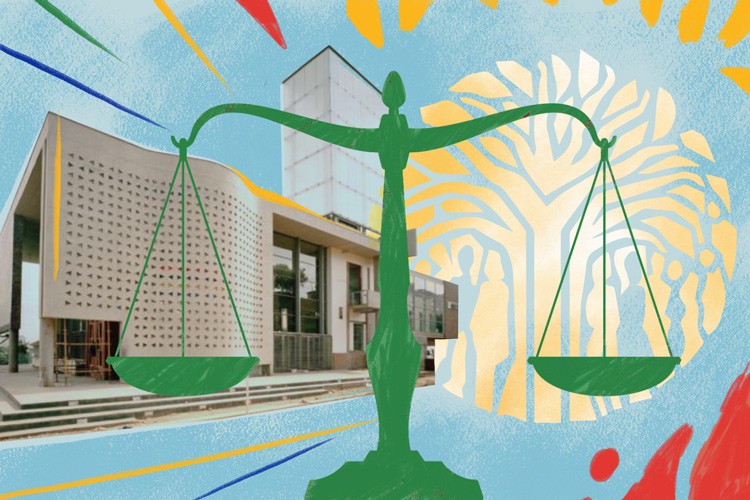Medical experts to assess health of judge facing tribunal
Judge Nomonde Mngqibisa-Thusi is facing possible impeachment for failing to hand down judgments timeously
Judge Nomonde Mngqibisa-Thusi is facing a disciplinary hearing before the Judicial Conduct Tribunal. Illustration: Lisa Nelson
- The tribunal to decide the fate of suspended Gauteng High Court Judge Nomonde Mngqibisa-Thusi has been postponed to 29 January.
- This is to allow for expert medical reports to challenge her possible impeachment for failing to hand down 21 judgments timeously.
- Tribunal chair, retired Constitutional Court Judge Chris Jafta, however, cautioned that judges must not be seen to be protecting their own. The complaint had been lodged three years ago.
Suspended Gauteng High Court Judge Nomonde Mngqibisa-Thusi, who is facing possible impeachment for failing to hand down 21 judgments timeously, will lead evidence by medical experts before the Judicial Conduct Tribunal.
The Tribunal, chaired by retired Constitutional Court Judge Chris Jafta, was supposed to start its work on Friday with the evidence of Gauteng Judge President Dunstan Mlambo, who made the complaint.
But evidence leader, Adrian Mopp, and Judge Mngqibisa-Thusi’s legal team, which includes her colleague Judge Gcina Malindi and former national director of public prosecutions Shaun Abrahams, asked for a postponement.
This is for the legal team to obtain expert medical reports and hand them over to Mopp who will then consult with Judge Mlambo before he gives evidence.
Mopp indicated that he might also need to consult with his own expert witnesses.
It was clear from proceedings on Friday, that Judge Mngqibisa-Thusi will not challenge the “stated facts” that she did not hand down her judgments on time. But she is likely to rely on evidence that she needed help and that she was not given assistance.
In her evidence before the Judicial Conduct Committee (JCC), which had recommended to the Judicial Services Committee that she face a tribunal to determine whether she suffers from incapacity or is grossly incompetent or guilty of gross misconduct, she spoke about experiencing personal problems. These included having to cope with a drug-addicted relative, an injury to her wrist and hand, and an excessive workload.
She said she had become depressed and had dealt with it through African customary ways.
Justice Jafta questioned why it was necessary for Mlambo to see the expert medical reports before testifying. “Is he an expert on the medical evidence to be presented?” he asked.
Mopp responded that he was the head of the Gauteng division and had “engaged” with Judge Mngqibisa -Thusi. “His lived experience could be different to what is presented in the reports,” Mopp said.
Retired Judge Dennis Davis, who also sits on the panel, said the case was “relatively confined” and it was not necessary to call “400 witnesses”.
With regards the request for the postponement until the end of January next year, Judge Davis said, “One of difficulties is that the JSC has been criticised heavily for tardiness in dealing with these sorts of cases. We have to balance the interests of the complainant and the judge. The longer the postponement, the more the inference is that these things never get resolved.”
Judge Jafta said such concerns were valid.
“It applies to all judges … We are seen as wanting to protect our own by delaying these proceedings,” he said, noting that the complaint had been lodged three years ago, in 2020.
“Where there is no option to postpone we have to, but we have to bear in mind our responsibility to start and complete the proceedings within a reasonable time,” he said.
Postponing the hearing until the week beginning 29 January, Judge Jafta said, “I hope we are going to finish”, cautioning that it was not necessary to “hear too many witnesses saying the same thing”.
Mlambo lodged a similar complaint against Judge Tshifhiwa Maumela, which has also been referred to a tribunal by the JCC.
In June this year, Chief Justice Raymond Zondo wrote to all Judge Presidents regarding the unacceptable ongoing situation of judges reserving judgments for, in some cases, up to five years. He instructed every Judge President to lodge misconduct complaints with the JCC against every errant judge.
Support independent journalism
Donate using Payfast

Don't miss out on the latest news
We respect your privacy, and promise we won't spam you.
Next: Two-year extension for Zimbabwe and Lesotho permit holders
Previous: Here are the 2023 Vodacom journalism award winners
© 2023 GroundUp. This article is licensed under a Creative Commons Attribution-NoDerivatives 4.0 International License.
You may republish this article, so long as you credit the authors and GroundUp, and do not change the text. Please include a link back to the original article.
We put an invisible pixel in the article so that we can count traffic to republishers. All analytics tools are solely on our servers. We do not give our logs to any third party. Logs are deleted after two weeks. We do not use any IP address identifying information except to count regional traffic. We are solely interested in counting hits, not tracking users. If you republish, please do not delete the invisible pixel.

